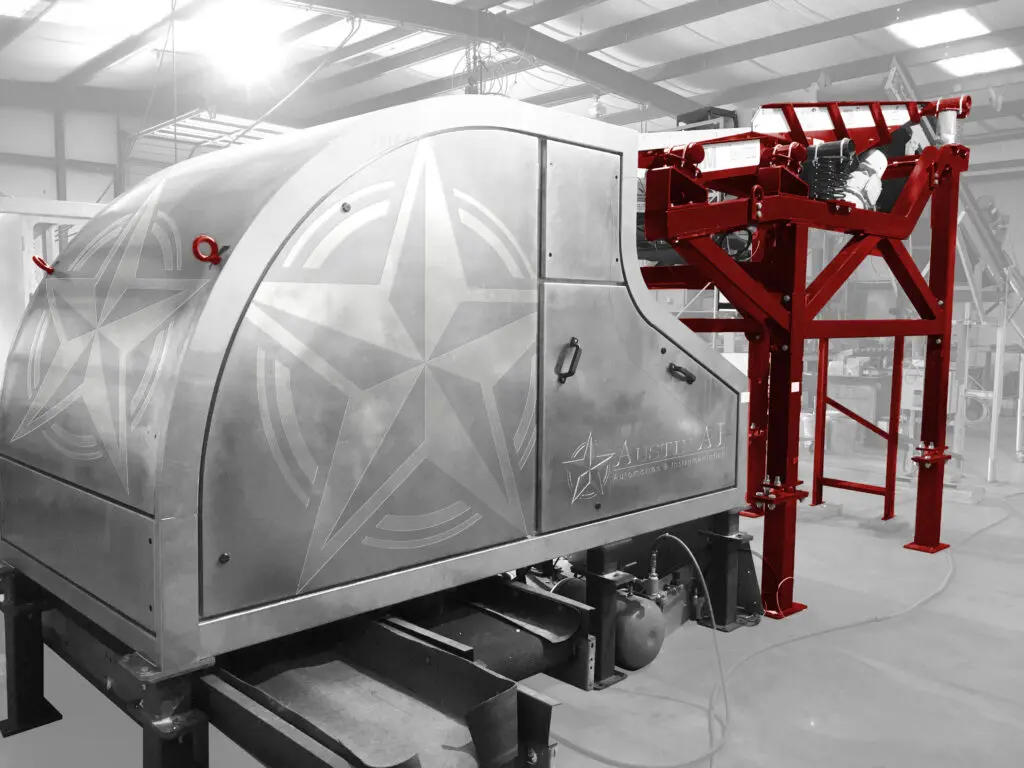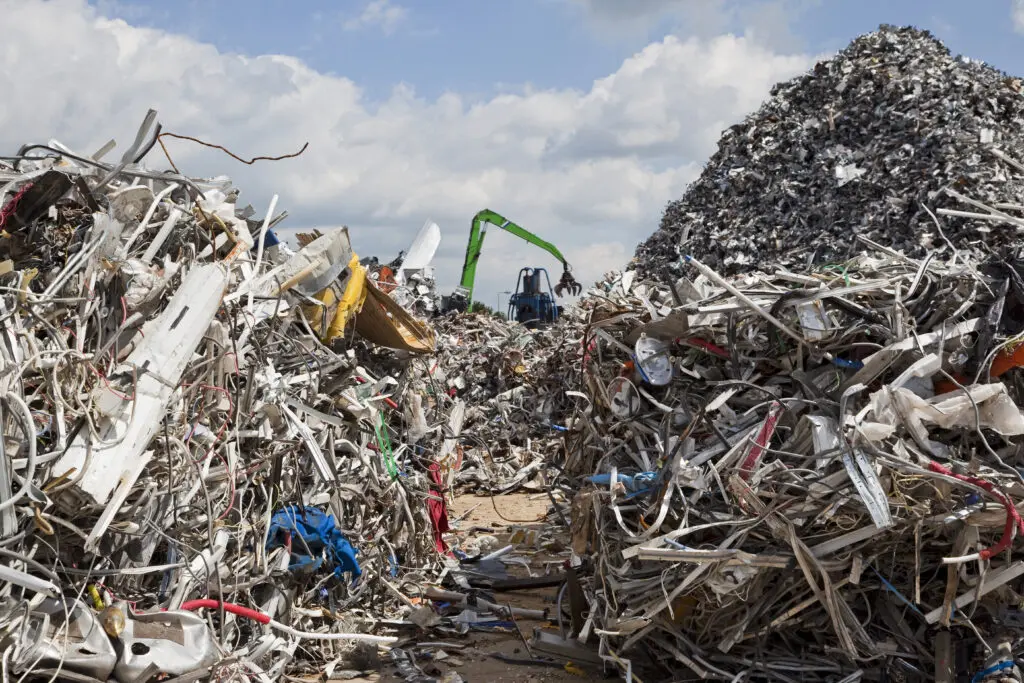Understanding how LIBS technology can deliver more, higher quality aluminium scrap is a first step to boosting business performance. Austin AI and Ocean Applied have been doing just that in partnership with a large British recycler.
Aluminium is the most abundant and environmentally friendly metal on earth. Quite often referred to as the ‘green’ metal, aluminium is sustainable and capable of being recycled and reused without loss of its inherent properties. Aluminium recycling is one of the most efficient forms of recycling, using up 95% less energy than creating aluminium materials from virgin materials (primary production).
Globally, aluminium demand is up while primary production is down with recycled aluminium expected to help fill the gap. Producers are creating new products with substantial amounts of recycled aluminium driven in part by the high energy costs to create primary aluminium, consumer demand for more environmentally friendly products and corporate sustainability goals.
During recycling, scrap aluminium is sorted into different grades: lights and heavies. Once preliminary sorting is done, the lights can be sold off as mixed lots to an aluminium producer to create new alloys for production or re-processing. However, the further the separation into individual grades, the higher the value of the scrap aluminium. A steady stream of highly sorted aluminium scrap means less melt adjustments with primary aluminium and a far ‘greener’ product.
This article details the justification and implementation of a fast, effective sorting system developed by Austin AI utilising Ocean Applied’s laser induced breakdown spectroscopy (LIBS) sensor with H Ripley and Co, a large recycler in the UK.
THE PROBLEM
Fast, cost-effective aluminium sorting has long been a desire for recyclers. H Ripley and Co, based in Hailsham, is a fifth-generation family-owned British scrap yard which has been in business for over 100 years. Like many yards, it has dealt in ferrous and non-ferrous scrap since its inception. However, unlike others, it has also been shredding aluminium for over 30 years.
Jason Ripley, commercial director with H Ripley and Co, realised a long time ago that significant value that could be extracted from aluminium if the right tools existed. His company was selling mixed aluminium containing multiple premium grades because a fast, cost-effective sorting tool was not available to separate the grades and alloys – and hand sorting was not an option. ‘The concept and need have been there all along,’ says Ripley. ‘There just was not the right technology to sort aluminium quickly and effectively.’ The significant uptick in aluminium demand over the past decade further drove this need.
H Ripley and Co, like other scrap recyclers, is a user of handheld X-ray fluorescence (XRF) and was aware of online X-ray solutions. While a good option for heavy metal sorting, X-ray does not lend itself well to sorting aluminium. Ripley was introduced to an Austin, Texas-based company, Austin AI, by one of his customers, a large UK extrusion ingot and sheet ingot production. This company had had success with Austin AI’s solution and urged him to investigate it further.
The further the separation into individual grades, the higher the value of the scrap aluminium.
SENSOR SORTING TECHNOLOGY
Austin AI ceo Rick Comtois is a veteran of elemental analysis and has been focused on online sensor sorting technology for over 20 years. Having previously implemented numerous units based on both nuclear magnetic resonance (NMR) and XRF technology, Comtois shifted his focus to LIBS in 2014. He says LIBS technology offers unparalleled light element technology that is not feasible with other methods.
The company’s interest in light element sorting solutions led to a relationship with Hydro Aluminium in which Austin AI built a sorting system for recovering aluminium 6063 from construction and demolition (C&D) material. The result of this process for Hydro Aluminium and any secondary smelter was melt-ready ‘green material’ allowing them a much-desired lower carbon footprint.
Austin AI’s LIBS sorting system offers the following advantage:
- reliable, robust modular design with minimal moving parts
- flexible setup with either one or six lanes, the latter design allowing for a LIBS module to be internally replaced to maintain uptime
- chute design where sample drops in front of the LIBS laser and there is no need to adjust focal distance per sample
- works with clean production scrap as well as post-consumer scrap with no pre-ablation needed
- lowest fully loaded cost per weight ratio in the world
- compatibility with Ocean Applied’s SpeedSorter LIBS sensor.

Online sorting provides significant advantages over manual sorting, including increased speed, accuracy, consistency, and efficiency. It also reduces labour costs, increases safety, and provides valuable data for optimising aluminium sorting.
‘I estimate the fully loaded cost, which includes the initial cost of the system, the operation, labour etc, to be a few cents per kilogram when running our sorter at 4-5 tonnes per hour,’ says Comtois. ‘This cost is outweighed by the premium gained per truckload for melt-ready scrap.’
As demand for sorting technology increased, especially in Europe, Austin AI established a European office in Budapest and is proud of the service support and training it can provide Europe-based customers like H Ripley.
ENERGETIC LASER PULSE
LIBS is a form of atomic emission spectroscopy using an energetic laser pulse highly focused at the sample surface to convert a small mass of a sample to plasma, causing the atoms and ions to emit their characteristic emission lines. For many, LIBS is recognised as optical emission spectroscopy (OES) that uses a laser instead of an arc or spark source. LIBS has been known and used for almost five decades in laboratory and research environments.
Recent technological advancements have made the design of online LIBS sensors, like the SpeedSorter from Ocean Applied, possible and available for use in industrial applications. This development rapidly expanded the use of LIBS, especially into field operations such as aluminium sorting and analysis.
Since LIBS is better suited for analysis of light elements such as lithium (Li), aluminium (Al), magnesium (Mg), and beryllium (Be) than handheld X-ray fluorescence (XRF), it is quickly gaining industry acceptance as a method of choice for sorting specific alloys from aluminium scrap.
SPEEDSORTER
Ocean Applied’s SpeedSorter is an industrial, high-throughput sensing system designed for inline, non-ferrous scrap sorting in difficult environments. Based on LIBS, the SpeedSorter quickly determines the chemical composition of each aluminium scrap object and communicates the result to Austin AI’s sorting system. With the SpeedSorter, separation of wrought from cast aluminium, aluminium from magnesium and alloy class separation like 6XXX from mixed aluminium scrap are easily accomplished. SpeedSorter can be customised to the exact needs with consideration of conveyor capabilities, input material and size, and desired output and diversion control.
Lu Luo, vp and general manager at Ocean Applied, says, ‘Our team here at Ocean Applied created the SpeedSorter which has enabled LIBS metal sorting to be commercially viable. It has overcome past LIBS sensor issues with capabilities to sort several tonnes per hour, obtain high purity with post-consumer scrap and even sort exact alloys from twitch or zorba.’

H RIPLEY AND CO’S ONLINE LIBS SORTING TECHNOLOGY
H Ripley set off to implement Austin AI’s sorting system late in early 2020. The project goal was to implement a solution for retrieving a steady stream of 6063 from mixed aluminium scrap. Working closely with both Austin AI and Ocean Insight, Ripley integrated the LIBS sorting system for shredded, clean, dry material in process post magnetic and eddy current separation.
Prior to the implementation of the sorting system, Ripley processed and primarily sold mixed aluminium to markets in Asia. Post implementation, Ripley is segregating and selling back the valuable portion to a large UK extrusion ingot and sheet ingot producer. This client has been pleased with the 6063 received from Ripley as it is within their specified tolerance and standard. Copper and zinc removal is key as the extrusion producer was looking for material below the 0.1% maximum allowable amount for each. Lower, in this case, is always better.
The following is the Alloy EN AW‐6063 [AlMg0.7Si] specification that Ripley was looking to achieve:
| Element | Specifications |
| Si | 0.2-0.6% |
| Fe | Max 0.35% |
| Cu | Max 0.1% |
| Zn | Max 0.1% |
| Mg | 0.45-0.9% |
| Cr | Max 0.1% |
| Mn | Max 0.1% |
| Others | 0.05%/each (Max 0.15%) |

The UK extrusion ingot and sheet ingot producer has been extremely satisfied with the material and Ripley’s LIBS sorter has provided the producer with a ‘worry free’ low carbon footprint stream of low Cu and Zn 6063 material.
Covid-19 related delays, as well as other unforeseen delays, have meant that the LIBS sorting system has been configured to its final operation mode months later than expected. Jason Ripley adds that ‘Austin AI, Ocean Applied and Ripley had a common goal of getting this project over the finish line so we had no doubt that the unit would be up and running and working effectively for us as soon as possible.’
Through the first several months, Ripley has been running 3-4 tonnes of material per hour through the sorting system. As noted by both Comtois and Ripley, material should be dry as material flows better when it is not wet. Size can vary but 5-6 inches is considered mid-range and best for higher throughput. Additional screening within the process will further assist with the high purity of the resulting material obtained.
PATH FORWARD
Jason Ripley is proud to see the LIBS sorting system implemented at his facility. He knew for decades that the need was there and that the technology would eventually be available to make it happen.
Ripley and Co is finding that the industry is not fully aware of LIBS or even that this sort of sensor technology exists. This has made expanding its customer base more challenging than initially thought. Jason Ripley spoke of going as far as to sponsor a trial load of LIBS segregated material for new clients for them to fully grasp the technology’s capability. Austin AI’s sorting system with integrated SpeedSorters offers clients like Ripley the ability to change sorting programs for segregating whatever alloy and tolerance is needed. This will allow them to add customers more easily with specific application requirements.
Ongoing installation of the LIBS sorting system at other yards that process large amounts of non-ferrous metals will help with adoption as will further use of hand-held LIBS based systems which are growing in popularity for light element analysis within the scrap industry.
Austin AI and Ocean Applied are pleased to offer the aluminium industry a rapid and effective solution for recovering melt-ready non-ferrous scrap. The LIBS sorting system facilitates efficient recycling, conserves resources, reduces energy consumption and emissions and promotes the transition to a circular economy. All these aspects collectively contribute to a greener environment and to meeting sustainability goals.
| For more information, please contact Ocean Applied or Austin AI. Ocean Applied 176 Anderson Avenue, Ste F304 Rochester, NY 14607 USA www.oceaninsight.com/solutions/industries/metal-recycling Austin AI, Inc. AAI Headquarters 8862 Hwy 290 W Austin, TX 78736 USA www.austinai.com/libs-tech Austin AI Europe Helsinki út 128 1238 Budapest, Hungary www.austinai-eu.com |
Don't hesitate to contact us to share your input and ideas. Subscribe to the magazine or (free) newsletter.



